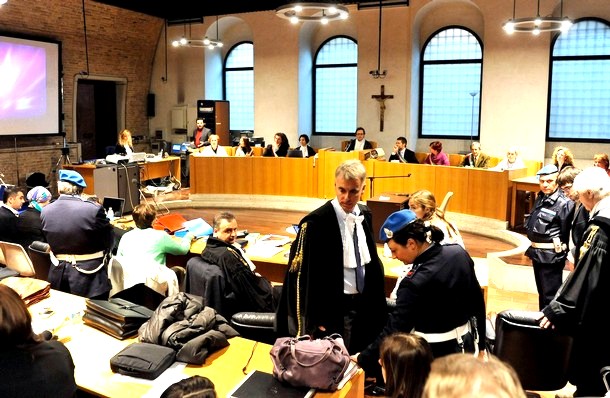
Category: The judical timeline
Friday, August 15, 2014
Legal Timeline Of The Main Case, On Which The Next Ruling By Supreme Court Could Be Final
Posted by catnip

Cassazione (Supreme Court of Italy) seen from the east across the Tiber River
Todays Status
The Supreme Court is due to rule, possibly in the autumn, on what might be the final appeal by Sollecito and Knox on grounds which have not been published. Main steps prior to this:
November 2007
Meredith Kercher is found violently killed in her home while studying abroad in Italy. Her housemate, Amanda Knox, and Amanda’s friend Raffaele Sollecito, as well as Amanda’s boss, Patrick Lumumba, are arrested. A fourth person, Rudy Guede, is tracked down and also arrested. Patrick Lumumba’s alibi is confirmed and he is released.
December 2007, January 2008
Due process hearings authorise the continuation of preventative custody for the suspects, on the grounds of flight risk and possibility of tampering with the evidence.
October 2008
Preliminary Hearing Court, Perugia, Micheli presiding ““ after investigations have completed, the committal hearing finds there is a case to answer and remands Amanda Knox and Raffaele Sollecito to stand trial on the charges of :
- (A) aggravated murder in company of Meredith Kercher
(B) illegal transport of a knife from Raffaele Sollecito’s apartment
(C) aggravated sexual assault in company of Meredith Kercher (later folded into charge (A), on the grounds of being part of the same criminal event)
(D) illegal profiting by possession, to wit: of a sum of money approx. €300 and of credit cards belonging to the victim, and her mobile phones
(E) simulation of a crime, to wit: staging a break-in in Filomena Romanelli’s room
(F) Amanda Knox, in addition, calunnia, for falsely claiming, knowing him to be innocent, Diya Lumumba also called “Patrick”, of being the author of the murder
Rudy Guede is tried summarily “on the papers”, as he has requested the expedited trial procedure (“fast-track” trial) and is found guilty of charges (A) and (C), and not guilty of the theft, charge (D), and sentenced to life, automatically discounted to 30 years for choosing the expedited trial procedure.
December 2009
On appeal to the Court of Appeals, Perugia (4/2009, on 22 December 2009), his sentence is reduced to 24 years, automatically discounted to 16 years, the aggravating factors of the charges not being found by the court. His final appeal, to the Supreme Court of Cassation, First Criminal Section, is rejected (7195/11, hearing of 16 December 2010, reasons handed down 24 February 2011).
December 2009
Court of Assizes, Perugia, presided over by Massei ““ finds Amanda and Raffaele guilty of all charges (except the theft of the money and credit cards) but without the aggravating factors applying, and sentences them, with mitigating factors included, to 26 years for Amanda, and 25 years for Raffaele (the extra year for Amanda being for the calunnia).
October 2011
Court of Appeals of the Court of Assizes, Perugia, presided over by Hellmann (after a last-minute replacement) ““ trial convictions quashed, except for the calunnia charge against Amanda (charge (F)), where sentence was increased to time served (3 years); both prisoners released (4/2011, decision 3 October 2011, reasons handed down 5 December 2011).
March 2013
The Supreme Court of Cassation (25/3/2013) found the acquittals on charges A&C, B, D, and E to be unsafe, and annulled that part of the decision, remanding the matter to the Florentine jurisdiction, as per the usual cascade rules, for a fresh determination, and rejected Amanda Knox’s appeal on the charge (F) conviction and sentence.
January 2014
Court of Appeals, Second Chamber, Florence, presided over by Nencini ““ trial convictions on the non-calunnia charges upheld, therefore sentence increased to 28 years and 6 months for Amanda (11/13, decision 30 January 2014, reasons handed down 29 April 2014). All convicted parties to pay the relevant compensation to the various injured parties. Appeals to the Supreme Court of Cassation have been lodged.
Associated Timelines
See the posts here and here on the timing of events arrived at by the trial judges.
Tuesday, December 01, 2009
Andrea Vogt Asks Some Useful Questions Concerning The Legal Process
Posted by Peter Quennell
Click here to read all of this well-researched report on the Seattle P-I website.
After presenting an overview of the system similar to those posted here by Nicki and Commisario Montalbano Andrea Vogt asks two experts on the system these questions.
Do jurors have to find Knox guilty beyond a reasonable doubt?
Yes. The concept of proof beyond a reasonable doubt has long been a part of Italy’s justice system. It was formalized and passed into law in 2006.
Knox’s defense lawyer Luciano Ghirga said his team will remind jurors that, even after more than 40 hearings, everything is still in doubt.
The court’s ruling (which is not called a verdict in Italy) is made by an eight-member jury: six laymen and two professional judges. They will vote, and the majority rules. In the case of a 4-4 tie, acquittal overrules.
Could Amanda Knox have plea bargained?
Knox maintains her innocence.
However, while not completely analogous to plea bargaining, Italy does have a similar alternative to trial, also a part of the 1988 reforms. The alternative is not applicable for serious crimes, such as murder, punishable by more than five years in prison.
Suspects who cooperate fully with the police, however, may become eligible for a bundle of mitigating circumstances that would lower prison sentences. A judge may also choose to apply aggravating circumstances to increase a sentence.
Negotiation on the evidence—in which both sides agree what can be admitted—is also available when defendants choose a fast-track trial, as did Rudy Guede, sentenced to 30 years last year for his role in the case for which Knox is on trial. Guede is appealing his conviction.
Why does the figure of prosecutor seem so powerful in Italy?
The prosecutor is a powerful figure in Italy connected to the judiciary, not elected or appointed. While there is a career separation between judges and prosecutors, the qualifying examination and training are common, That has made judges and prosecutors close both culturally and professionally.
In the U.S., prosecutors are appointed in federal system and typically elected in the state system, hence it is common to hear cases referred to as The State vs. X.
In Italy, protections were put in place precisely to prevent the state from pursuing or persecuting, hence the independence of prosecutors.
As a result, prosecutors haven’t shied away from taking on politicians. Italian Premier Silvio Berlusconi, for example, faces a series of criminal procedures in the courts.
That independence , some argue, is precisely the protection needed as a check against government power, and without it, corruption could not be exposed, said Maffei. But others argue that prosecutors wage their own political battles. using their independence to attack political opponents.
Another major difference: the prosecutor supervises the investigation rather than letting police handle it.
Further, he or she also has no discretion over the decision to seek charges. There is a constitutional principle of mandatory prosecution. If there is sufficient evidence to build a case against a defendant, a prosecutor must seek an indictment.
In the U.S. prosecutors can and do drop cases for such reasons as workload or because the defendant has agreed to help with a criminal investigation.
Was it legal for Knox not to have an attorney present when police questioned her?
Yes and No.
Amanda Knox’s interrogation falls into a gray area of the law because she came voluntarily to the police station and was being interviewed in the beginning as someone who could become be a witness, not a suspect.
Then, in the course of questioning by police in November 2007, she blamed Patrick Lumumba for the slaying, and said she was present at the scene of the crime. Lumumba was innocent. Knox has since denied she knows anything about the slaying and says she wasn’t in the flat the night Kercher was killed. Limumba is suing Knox for slander.
The law is very clear: A suspect must not be interrogated without a lawyer.
Once a suspect, an interrogation must be interrupted, the suspect read his or her rights to remain silent and be provided a lawyer. Italian law does not allow waiver of one’s right to counsel. Even if a suspect doesn’t want a lawyer, the authorities are required to appoint one.
If a suspect’s freedom of movement is hindered, the interrogation must be videotaped.
In Knox’s case, a video or audio recording of the entire police interrogation (authorities have denied that any such recordings exist) could identify when police began treating Knox as a suspect and what procedures were followed.
In fact, Italy’s Supreme Court has already said that some of her early statements may not be used against her because they were made without an attorney present.

